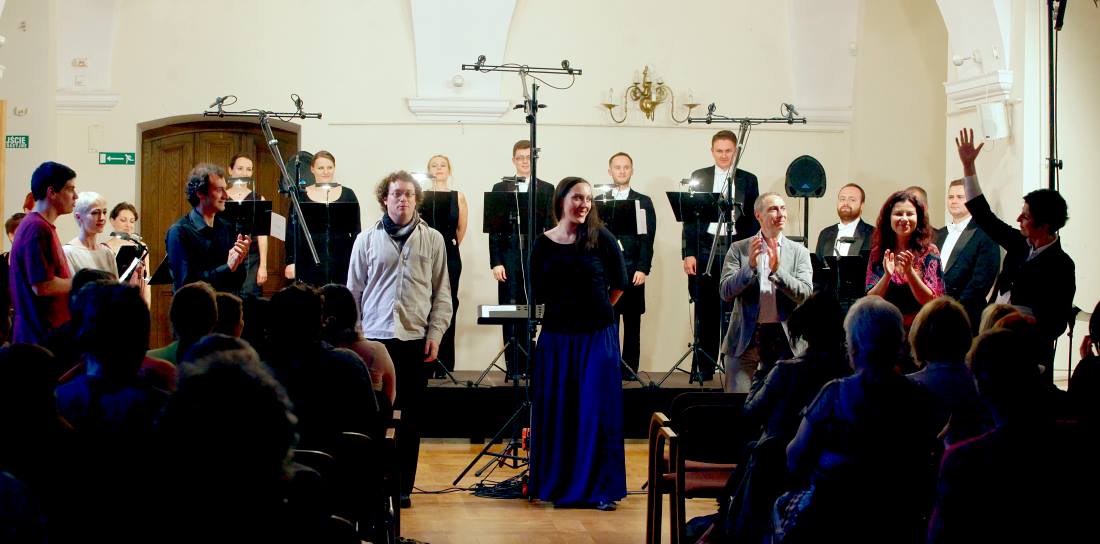Balance – lost (2013)
I believe that how we learn about life, about experiencing it and interpreting it, is somewhat similar to how a child learns language. From breath to voice, from voice to word, from word to phrase, the ability to express, to interpret, to explain, is constatly growing, but the experiences behind, the essence of what is being said remains unchanged.
Near the end of Balance – lost I paraphrase the first line of the four-part setting of the French chanson Mille regretz: “Mille regretz de vous abandoner“ [“A thousand regrets at deserting you“]. With the exception of different sonifications of breath, all of the text used in the piece is derived from the first two words of the song (mi-i-le-e-re-gre-ts-s, with permutations) and the sonorous potential of this material. That way, I tried to cause the same “understanding backwards“ process in a listener that I had had while writing, and that we all have whenever thinking about our lives; I tried to make every re being remembered as part of regretz.
Near the end of Balance – lost I paraphrase the first line of the four-part setting of the French chanson Mille regretz: “Mille regretz de vous abandoner“ [“A thousand regrets at deserting you“]. With the exception of different sonifications of breath, all of the text used in the piece is derived from the first two words of the song (mi-i-le-e-re-gre-ts-s, with permutations) and the sonorous potential of this material. That way, I tried to cause the same “understanding backwards“ process in a listener that I had had while writing, and that we all have whenever thinking about our lives; I tried to make every re being remembered as part of regretz.
Performed by Wrocław Philharmonic Choir w. Agnieszka Frankow-Żelazny
Balance – lost (2013)
za mešoviti hor
Mislim da je to kako učimo o životu, o doživljavanju i tumačenju života, donekle slično tome kako dete savladava jezik. Od daha do glasa, od glasa do reči, od reči do fraze, sposobnost izražavanja, tumačenja, objašnjavanja, stalno raste, ali doživljaji iza iskustava, suština onoga što je rečeno, ostaju nepromenjeni.
Pri kraju Balance – lost parafraziran je prvi red četvoroglasnog aranžmana francuske šansone Mille regretz: “Mille regretz de vous abandoner“ [„Hiljadu kajanja što te napustih”]. Pored različitih sonifikacija daha, kompletan tekst korišćen u kompoziciji izvede je iz prve dve reči pesme (mi-i-le-e-re-gre-ts-s, sa permutacijama), i zvučnog potencijala ovog materijala. Na taj način pokušala sam da izazovem kod slušaoca isti proces „razumevanja unazad“ koji sam ja imala dok sam pisala, i koji svi imamo kada razmišljamo o svojim životima; pokušala sam da svako re bude zapamćeno kao deo regretz.
za mešoviti hor
Mislim da je to kako učimo o životu, o doživljavanju i tumačenju života, donekle slično tome kako dete savladava jezik. Od daha do glasa, od glasa do reči, od reči do fraze, sposobnost izražavanja, tumačenja, objašnjavanja, stalno raste, ali doživljaji iza iskustava, suština onoga što je rečeno, ostaju nepromenjeni.
Pri kraju Balance – lost parafraziran je prvi red četvoroglasnog aranžmana francuske šansone Mille regretz: “Mille regretz de vous abandoner“ [„Hiljadu kajanja što te napustih”]. Pored različitih sonifikacija daha, kompletan tekst korišćen u kompoziciji izvede je iz prve dve reči pesme (mi-i-le-e-re-gre-ts-s, sa permutacijama), i zvučnog potencijala ovog materijala. Na taj način pokušala sam da izazovem kod slušaoca isti proces „razumevanja unazad“ koji sam ja imala dok sam pisala, i koji svi imamo kada razmišljamo o svojim životima; pokušala sam da svako re bude zapamćeno kao deo regretz.
